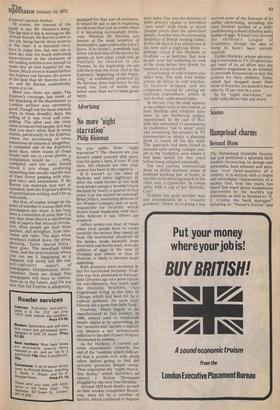Advertising
No more 'night starvation'
Philip Kleinman
Do you suffer from "night starvation"? The chances are you haven't asked yourself that question for quite a time, if ever. If you have, the chances are that your answer has been in the negative.
If it weren't so, the sales of Horlicks and other nightcaps in what the trade knows as the milk food drinks category wouldn't have declined by nearly a quarter in five years. Can the market be restored? Brian Jeffery, marketing director of the Wander company and, as such, responsible for Ovaltine, which shares brand leadership with Horlicks, believes it can. Others are sceptical. Jeffery points out that, at times when most people have to count carefully the money they spend on food, the nutritional character of the drinks, made basically from dried milk and barley malt, with the addition of eggs in the case of Ovaltine and wheat in that of Horlicks, is likely to become more appealing. Both products were invented in fact for nutritional purposes. Ovaltine was first produced in Switzerland 110 years.ago as a prescription for convalescents. Not much later the Horlicks brothers, two Englishmen living at the time in Chicago which had been hit by a typhoid epidemic, hit upon their formula for a germ-free baby food. Ovaltine, which began to be manufactured in this country in 1908, always used to emphasise health claims in its advertising. In the 'twenties and 'thirties a nightly cup became a not unimportant addition to the diet of poor children threatened by rickets.
As for Horlicks, it carried out some experiments towards the end of the 'twenties which indicated that a protein rich milk drink taken before going to bed did acutally promote deeper sleep. Thus originated the "night starvation theme," which Horlicks's ad agency J. Walter Thompson plugged for the next four decades.
Around 1970 both drinks, as well as their weaker competitor Bournvita, were hit by a number of factors, which combined to depress
their sales. One was the decision of some grocery chains to introduce "own label" milk foods at much cheaper prices than the advertised brands. Another was the increasing flexibility of British feeding habits. In the old days it was always tea at tea time and a nightcap drink — perhaps cocoa if not Horlicks or Ovaltine — at bedtime. But now people were not bothering to look at the clock before they drank, for instance, a cup of coffee.
A'succession of mild winters also didnt help. The milk food drinks always do better in cold weather. So turnover dropped, and the companies reacted by cutting advertising expenditure, which in turn further undermined sales.
In the last year the slide appears to have been more or less halted, as both Horlicks and Ovaltine have been, to use marketing jargon, repositioned. In the case of Horlicks this amounted to abandoning its traditional "aid to sleep" story and presenting the product in TV commercials as simply a pleasant drink to round off the day with. This approach had been found to increase sales among younger people in the Yorkshire area where it had been tested for two years before being adopted nationally. The two current commercials Show an idyllic domestic scene of husband working late at home, in one film at his drawing board, in the other over a typewriter. In comes wifey with a cup of hot Horlicks. Cosy!
Ovaltine has gone another way and concentrated on a "country goodness" theme. In so doing it has
revived some of the features of its earlier advertising, including the once familiar symbol of a milkmaid bearing a sheaf of barley and a basket of eggs. It hasn't yet revived the children's League of Ovaltineys, though the idea of doing so hasn't been entirely rejected.
Unlike Horlicks, whose advertising is restricted to TV, Ovaltine has put most of its ad effort into the women's magazines in an attempt to persuade housewives to buy the product for their children. Sales, which had dropped more than those of Horlicks, are stated to have risen by 15 per cent in a year. • As for "night starvation," nobody talks about that any more.


































 Previous page
Previous page